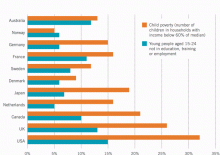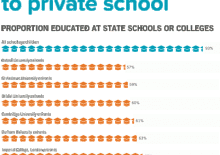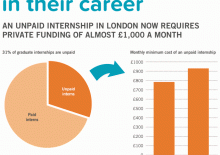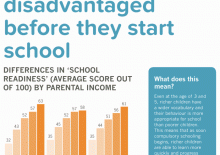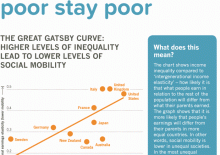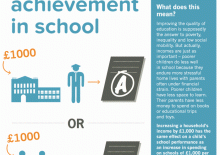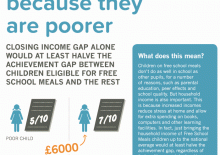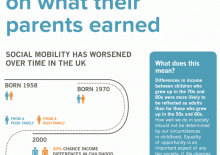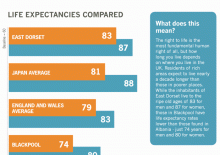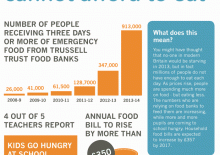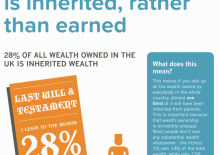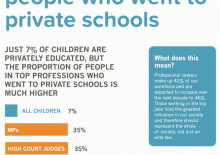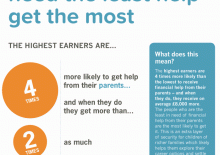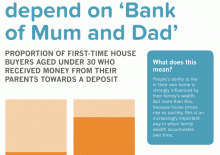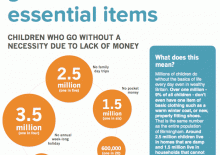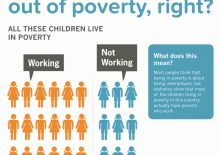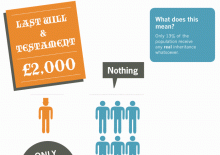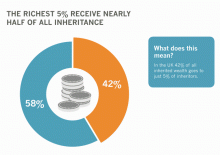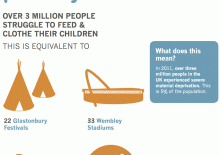Tag: life chances
Briefing 64: There are more disadvantaged children in Britain than in many other advanced economies
16 October 2015 • A higher proportion of UK children grow up in households with incomes well below the national median, while more young people in the UK are not in education, employment or training
Briefing 60: Top Universities are dominated by students who went to private school
11 June 2015 • Barely half of entrants to Oxford University are state educated, compared to 93% of the wider population
Briefing 53: Being born into a rich family gives people a headstart in their career
20 February 2015 • Richer parents can fund valuable unpaid internships for their children, giving them an unfair advantage over those from poorer households
Briefing 51: Poorer Children are already disadvantaged before they even start school
16 January 2015 • Differences in income hinder children's progress from a very young age
Briefing 50: In the UK, the rich stay rich and the poor stay poor
28 November 2014 • Equal opportunities depend on more equal outcomes - the UK is more unequal than other countries, meaning fewer people who are born poor become rich
Briefing 41: Increasing family incomes improves children’s achievement in school
31 July 2014 • Raising household incomes by £1,000 would lead to better outcomes for poorer children than spending an extra £1,000 per child on schools
Briefing 40: Poorer children do worse in school because they are poorer
25 July 2014 • Studies show that increasing household incomes would reduce the school achievement gap between rich and poor children, regardless of school or parenting quality
Briefing 39: Social mobility in the UK is falling
17 July 2014 • Differences in income between children are increasingly likely to be mirrored as adults
Briefing 37: People in poor areas die younger
4 July 2014 • Life expectancy in rich areas is nearly a decade longer than in the poorest parts of the UK
Briefing 34: People in the UK cannot afford to eat
13 June 2014 • Though the UK's total wealth is amongst the highest in the world, many people across the country cannot afford to eat
Briefing 26: Almost one third of wealth in the UK is inherited, not earned
11 April 2014 • Wealth in the UK is unequal because some people inherit so much more than others
Briefing 25: Top jobs are dominated by people who went to private school
4 April 2014 • Just 7% of people were educated privately, but they form a majority of certain top professions
Briefing 24: The people who need the least help, get the most
28 March 2014 • The highest earners are more likely to have received financial support from their parents
Briefing 22: Most first-time house-buyers depend on the ‘Bank of Mum and Dad’
14 March 2014 • Young people now need wealthy parents if they want to own their own home
Briefing 21: millions of children go without essential items
7 March 2014 • Research shows that children have to cope without everyday items that most people would consider basic necessities
Don’t miss out – subscribe to our FREE weekly briefing.
Recent briefings
- Briefing 65: Privately educated children earn more than state-educated children with the same grades
- Briefing 64: There are more disadvantaged children in Britain than in many other advanced economies
- Briefing 63: Reducing inequality doesn’t harm the economy
- Briefing 62: Rising inequality has reduced the UK’s economic growth
- Briefing 61: Regional inequality in the UK is the worst in Western Europe

